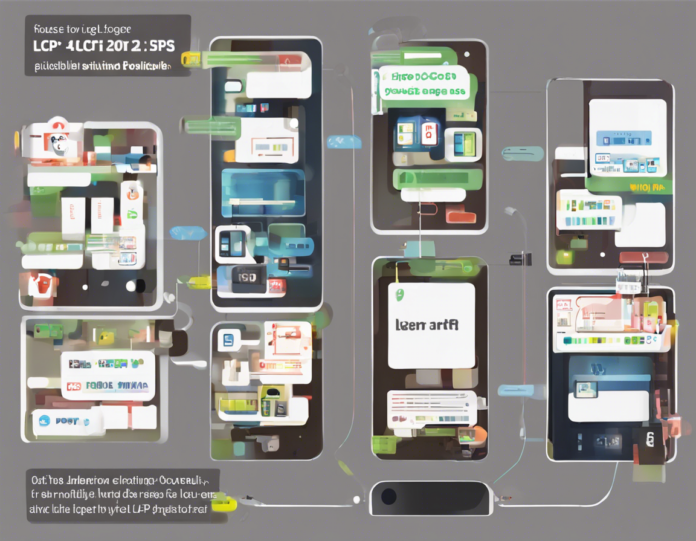For website owners and developers, ensuring a smooth user experience on mobile devices has become paramount. With Google’s focus on Core Web Vitals – a set of metrics that measure user experience – the Largest Contentful Paint (LCP) plays a crucial role in determining how quickly a page loads its main content. An LCP longer than 4 seconds can result in poor user experience, higher bounce rates, and lower search engine rankings. In this article, we will delve into fixing LCP issues on mobile devices that exceed this critical threshold.
Why Does LCP Matter?
LCP is a critical metric because it gauges how quickly users can see the main content of a page load. It helps in assessing the user experience and overall performance of a website. With the increasing use of mobile devices for browsing, having a fast LCP is essential for retaining users and improving search engine rankings.
Factors Affecting LCP on Mobile Devices
Several factors can impact LCP on mobile devices, including:
1. Large Images and Videos
- Optimizing images and lazy loading videos can help reduce the load time and improve LCP.
2. Render-Blocking Resources
- CSS and JavaScript files that block rendering can delay the LCP. Minifying and deferring these resources can be beneficial.
3. Server Response Time
- Slow server responses can lead to delayed content delivery. Improving server performance and utilizing content delivery networks (CDNs) can enhance LCP.
4. Excessive Third-Party Scripts
- Third-party scripts like analytics trackers and social media plugins can hamper LCP. Evaluating the necessity of these scripts and reducing their impact is crucial.
Strategies to Improve LCP on Mobile Devices
To address LCP issues on mobile devices exceeding 4 seconds, consider the following strategies:
1. Optimize Images and Videos
- Compress images, use modern formats like WebP, and lazy load off-screen images. For videos, consider hosting on external platforms or using lazy loading techniques.
2. Minimize Render-Blocking Resources
- Minify CSS and JavaScript files, inline critical CSS, and defer non-essential scripts. Utilize asynchronous loading for optimal rendering.
3. Enhance Server Performance
- Upgrade hosting plans, implement caching mechanisms, and utilize CDNs to reduce server response times. Opt for server-side rendering for dynamic content.
4. Audit and Remove Unnecessary Scripts
- Regularly review third-party scripts, plugins, and tracking codes. Remove or defer scripts that do not directly impact the core functionality of the page.
5. Prioritize Above-the-Fold Content
- Ensure that critical above-the-fold content loads quickly. Optimize the order of resource loading to prioritize essential elements for a faster LCP.
6. Utilize Browser Caching
- Set caching headers to leverage browser caching. This allows returning visitors to load cached resources, reducing load times and improving LCP.
7. Implement Code Splitting
- Break down large JavaScript bundles into smaller chunks to facilitate quicker loading of essential scripts. Dynamically load non-critical code as needed.
8. Monitor and Test Regularly
- Use tools like Google PageSpeed Insights, Lighthouse, and WebPageTest to monitor LCP metrics. Conduct regular tests and optimizations to maintain a fast LCP.
Frequently Asked Questions (FAQs)
1. What is a good LCP score for mobile devices?
- A good LCP score for mobile devices is under 2.5 seconds, as per Google’s recommendations.
2. How can I check my website’s LCP score on mobile devices?
- You can use tools like Google PageSpeed Insights, Lighthouse, or Chrome DevTools to analyze your website’s LCP performance on mobile devices.
3. Why is LCP important for SEO?
- LCP is crucial for SEO because Google considers page loading speed, including LCP, as a ranking factor. Websites with faster LCP tend to rank higher in search results.
4. Should I prioritize LCP over other Core Web Vitals metrics?
- While LCP is important, it is advisable to focus on all Core Web Vitals metrics collectively for a well-rounded user experience. However, addressing LCP issues is a significant step towards optimization.
5. Can optimizing LCP on mobile devices improve conversion rates?
- Yes, improving LCP on mobile devices can enhance user experience, reduce bounce rates, and lead to increased engagement and conversions on your website.
In conclusion, addressing LCP issues on mobile devices longer than 4 seconds is crucial for enhancing user experience, improving search engine rankings, and boosting conversions. By implementing strategies to optimize images, minimize render-blocking resources, enhance server performance, and prioritize critical content, website owners and developers can effectively improve their LCP scores and provide a seamless browsing experience for mobile users. Regular monitoring, testing, and optimization are key to maintaining a fast LCP and staying ahead in the competitive online landscape.


